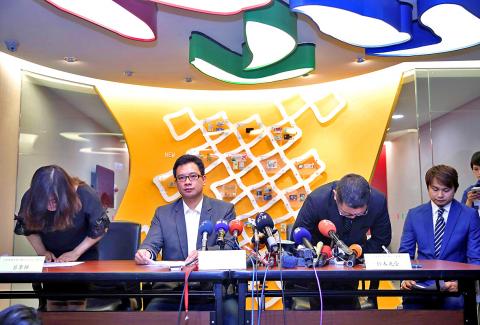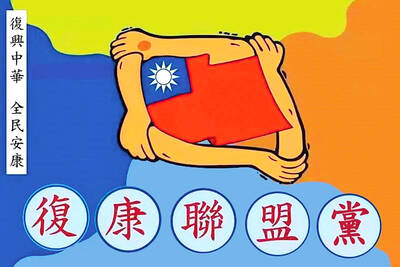The Japanese agent and personal representative of Yui Hatano, a Japanese adult video actress, yesterday bowed at a Taipei news conference to apologize for providing a previously published photograph for Taipei EasyCard Corp (悠遊卡公司) to use in a series of special-edition cards.
The company had invited Hatano to Taiwan for a photography session to produce images for two versions of her card, one “angel” and one “demon.”
Although the cards were not scheduled to be launched until Tuesday next week, there had already been a lot of discussion on the Internet, not only about the choice of Hatano, but that one image had been used on the cover of one of her adult videos.

Photo: CNA
EasyCard chairman Tai Chi-chuan (戴季全) said that a temporary hold had been placed on sales of the “angel” card, adding that there would be restrictions on where the card could be purchased so that buyer’s age requirements could be enforced.
However, he said the company had done nothing illegal in selecting Hatano as a model.
Asked if Hatano’s status as an adult video star might harm the reputation of the company and the Taipei City Government, he said that he had not violated “public decency” or intended to challenge legal limits.
The controversy was the result of cultural differences between Japan and Taiwan, he said.
Hatano’s agent, Mitsukazu Suzuki, and personal representative Lu Chi-hua (呂季樺) apologized for providing an old photograph.
Suzuki said that while his company had full authorization to provide both pictures, Japanese and Taiwanese had different understandings about using previously publicized photographs.
He said that a new photograph of Yui would be taken for the “angel” card.
He said his firm had represented Hatano for four years and was working to downplay her image as an adult video star.
Lu read a statement from Hatano, who said she was happy to have the opportunity to work with EasyCard, even though her pictures might create controversy.
“Although I am an adult video star, does that mean I cannot give back to Taiwan?” she said in the statement read by Lu.
Although the cards have not been released, seven “angel” cards with the controversial photo were listed yesterday on the Ruten online auction site, priced at more than NT$40,000.
EasyCard spokesman Lin Hsiao-chi (林筱淇) said she had taken 10 sets of the cards out of storage on Wednesday so the media could take pictures, but had lost track of seven sets.
EasyCard had contacted the sellers of the cards on Ruten — but is not considering legal action at this time, she said.
Additional reporting by Abraham Gerber

AIR DEFENSE: The Norwegian missile system has proved highly effective in Ukraine in its war against Russia, and the US has recommended it for Taiwan, an expert said The Norwegian Advanced Surface-to-Air Missile Systems (NASAMS) Taiwan ordered from the US would be installed in strategically important positions in Taipei and New Taipei City to guard the region, the Ministry of National Defense said in statement yesterday. The air defense system would be deployed in Taipei’s Songshan District (松山) and New Taipei City’s Tamsui District (淡水), the ministry said, adding that the systems could be delivered as soon as the end of this year. The US Defense Security Cooperation Agency has previously said that three NASAMS would be sold to Taiwan. The weapons are part of the 17th US arms sale to

SERIOUS ALLEGATIONS: The suspects formed spy networks and paramilitary groups to kill government officials during a possible Chinese invasion, prosecutors said Prosecutors have indicted seven retired military officers, members of the Rehabilitation Alliance Party, for allegedly obtaining funds from China, and forming paramilitary groups and assassination squads in Taiwan to collaborate with Chinese troops in a possible war. The suspects contravened the National Security Act (國家安全法) by taking photos and drawing maps of key radar stations, missile installations and the American Institute in Taiwan’s headquarters in Taipei, prosecutors said. They allegedly prepared to collaborate with China during a possible invasion of Taiwan, prosecutors said. Retired military officer Chu Hung-i (屈宏義), 62, a Republic of China Army Academy graduate, went to China

INSURRECTION: The NSB said it found evidence the CCP was seeking snipers in Taiwan to target members of the military and foreign organizations in the event of an invasion The number of Chinese spies prosecuted in Taiwan has grown threefold over a four-year period, the National Security Bureau (NSB) said in a report released yesterday. In 2021 and 2022, 16 and 10 spies were prosecuted respectively, but that number grew to 64 last year, it said, adding that the Chinese Communist Party (CCP) was working with gangs in Taiwan to develop a network of armed spies. Spies in Taiwan have on behalf of the CCP used a variety of channels and methods to infiltrate all sectors of the country, and recruited Taiwanese to cooperate in developing organizations and obtaining sensitive information

BREAKTHROUGH: The US is making chips on par in yield and quality with Taiwan, despite people saying that it could not happen, the official said Taiwan Semiconductor Manufacturing Co (TSMC, 台積電) has begun producing advanced 4-nanometer (nm) chips for US customers in Arizona, US Secretary of Commerce Gina Raimondo said, a milestone in the semiconductor efforts of the administration of US President Joe Biden. In November last year, the commerce department finalized a US$6.6 billion grant to TSMC’s US unit for semiconductor production in Phoenix, Arizona. “For the first time ever in our country’s history, we are making leading edge 4-nanometer chips on American soil, American workers — on par in yield and quality with Taiwan,” Raimondo said, adding that production had begun in recent